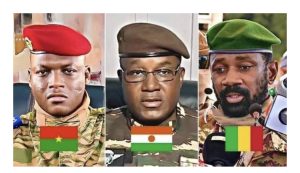BURKINA FASO, MALI, and NIGER, CONSIDER BRICS MEMBERSHIP AMIDST GEOPOLITICAL RESHUFFLING.

Burkina Faso, Mali, and Niger have embarked on a notable geopolitical shift by aligning with BRICS following their departure from the Economic Community of West African States (ECOWAS) and the expulsion of French forces from their territories. This move grants them newfound autonomy to pursue policies beneficial to their national interests without external constraints.
Recent reports highlight significant declines in terrorism since severing ties with France. Niger, in particular, has emerged as Africa’s fastest-growing economy post-dissociation from Western influences.
The potential integration of these Sahel nations into BRICS, supported by Russia, holds strategic implications. It marks a departure from Western dominance, fostering new economic alliances that could reshape regional dynamics. This alignment aims to reduce dependency on Western aid and enhance economic sovereignty. This should serve as a lesson to some European Countries that there’s time for everything, and to other African Countries under the Western influence that for Africa to be free and democratic there’s need for a significant shift from the traditional values to the modern values in line with the present reality.
The economic potential of Burkina Faso’s gold reserves and Mali’s substantial gold production, coupled with Niger’s critical uranium resources, underscores their strategic importance in global markets. These resources are pivotal as global economic strategies shift away from the US dollar.
Russia’s involvement in bolstering these nations’ infrastructure and military capabilities signifies a significant geopolitical realignment in the Sahel. The expulsion of French and UN forces further solidifies this shift, marking a pivotal moment in regional dynamics.
As these nations navigate their new alliances, they seek to strengthen economic ties, promote development, and assert their sovereignty on the global stage. This strategic realignment promises to reshape the geopolitical landscape of West Africa, influencing economic policies and international relations in the region.
This transformation reflects a broader trend towards diversifying global economic frameworks away from Western dominance, with potential far-reaching implications for global geopolitics and economic stability.
Stephen Gums
AFRICANPARROT TV.







Abdulzallam Adetunji
2 months agoThere’s no other way round for other African countries to attain a complete true sovereignty other than follow the footsteps of Burkina Faso, Mali and Niger. It’s then they’ll be free from the sackle of western slavery.